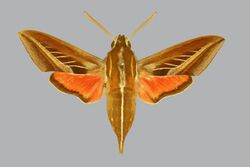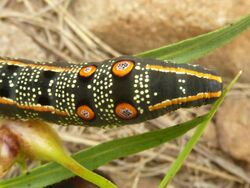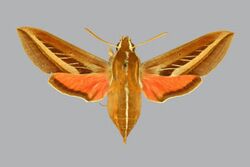Biology:Basiothia schenki
| Brown striped hawk | |
|---|---|

| |

| |
| Male imago (above) and caterpillar feeding on Pentanisia herb (below) | |
| Scientific classification | |
| Kingdom: | Animalia
|
| Phylum: | |
| Class: | |
| Order: | |
| Family: | |
| Genus: | |
| Species: | B. schenki
|
| Binomial name | |
| Basiothia schenki (Moschler, 1872)[1]
| |
| Synonyms | |
| |
Basiothia schenki, the brown striped hawk, is a moth of the family Sphingidae. The species was first described by Heinrich Benno Möschler in 1872. It is known from Zimbabwe and South Africa .[2]
It has a close plant-pollinator relationship with Disa cooperi, whose scent attracts only two hawkmoth species, Basiothia schenki and Agrius convolvuli, that can effectively pollinate its flower. The moths' proboscis length and the orchid's spur length align perfectly with its petals and position of the pollinaria and stigma, although B. schenki has a shorter proboscis than A. convolvuli and must fly almost up to the flower and press against it.[3] Adults are also pollinators of Satyrium longicauda[4] and Zaluzianskya natalensis.
The larvae feed on Vernonia species.
References
- ↑ "CATE Creating a Taxonomic eScience - Sphingidae". Cate-sphingidae.org. https://www.cate-sphingidae.org/taxonomy/Basiothia/schenki.html. Retrieved 2011-10-26.
- ↑ Carcasson, R. H. (1967). "Revised Catalogue of the African Sphingidae (Lepidoptera) with Descriptions of the East African species". Journal of the East Africa Natural History Society and National Museum 26 (3): 1–173. https://www.biodiversitylibrary.org/page/51111621#page/279/mode/1up.
- ↑ "After dark, moths, as well as bats, take over the pollinating night shift". Aggie-horticulture.tamu.edu. http://aggie-horticulture.tamu.edu/galveston/beneficials/beneficial-65_pollinators-moths.htm. Retrieved 2011-10-26.
- ↑ Jersáková, J.; Johnson, S. D. (June 2007). "Protandry Promotes Male Pollination Success in a Moth-Pollinated Orchid". Functional Ecology 21 (3): 496–504. doi:10.1111/j.1365-2435.2007.01256.x.
Wikidata ☰ Q2605294 entry
 |


